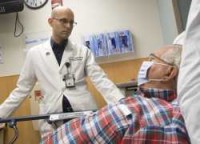24 Jan Genes Identified That May Predispose Some Individuals to Getting Sick

Dr. Ephraim Tsalik
Duke Health
MedicalResearch.com Interview with:
Ephraim L. Tsalik, MD MHS PhD
Assistant Professor of Medicine
Division of Infectious Diseases
Center for Applied Genomics & Precision Medicine
Duke University Medical Center
Emergency Department Service Line
Durham VA Medical Center
Medical Research: What is the background for this study? What are the main findings?
Dr. Tsalik: This study was motivated by the convergence of two research interests. The first was spearheaded by Dr. Sack, leading our collaboration at Johns Hopkins. Dr. Sack and his colleagues have a long history and expertise in studying enteric infections such as E. coli. The second is our group here at Duke’s Center for Applied Genomics & Precision Medicine as well as the Durham VA Medical Center. Specifically, we have an interest in studying the host response to infectious disease. One of the ways we’ve done that historically is through challenge studies where healthy volunteers are exposed to a pathogen in a controlled setting. Despite everyone getting the same exposure, not everyone gets sick. That observation gives us a unique opportunity to study the host biology of symptomatic individuals, asymptomatic individuals, and what distinguishes the two from each other. That is precisely what we did here.
Volunteers ingested Enterotoxigenic E. coli (ETEC), which is a common cause of traveler’s diarrhea. Some subjects became ill with diarrhea while others remained well. In this study, we focused on gene expression patterns, which is a snapshot of how genes in the body are being used in response to this infection. Some genes are more active, some are less. The pattern of those changes that occur in response to infection is what we call a “signature”.
This approach allowed us to generate some key findings. First of all, we were able to define the genes involved in the body’s response to this type of E. coli infection. Second, we discovered genes that were differentially expressed at baseline that could distinguish people who would go on to become ill from those that would remain healthy. Although this study was not designed to identify the mechanism for that resilience to infection, it does focus our attention on where to look. We suspect the genes we identified are likely to play a role in infectious disease resilience and susceptibility based on their known immune function roles. We also have data, which wasn’t published in this study, that implicates some of these genes in the resilience to other infections such as influenza.
The last major finding was something called Drug Repositioning Analysis. This is a tool that allowed us to identify drugs and drug classes that could be used to mitigate infections caused by ETEC. That analysis highlighted some compounds already known to be effective such as Zinc. But it also identified several other drug classes that have not previously been investigated and could be important tools to combat such infections especially as antibiotic resistance looms.
Medical Research: What should clinicians and patients take away from your report?
Dr. Tsalik: There are a few key points to take away. Most people will recognize that some people are just prone to getting sick. There are those out there who say they haven’t had a cold in years. And then there are people who some to get one every month. Or hundreds (or thousands) of people might be exposed to tainted food but only some get ill. This study offers a molecular and biological explanation for why that might be. Another key point is that all patients exposed to ETEC in this study shed the bacteria in their stools at some point, even those without symptoms. So just because someone feels well, they might still be capable of spreading infection. Lastly, the rising tide of antibacterial resistance is a globally recognized problem. In addition to expanding the repertoire of available antibiotics, we should also consider treatments that target the host response. Gene expression data of the sort generated in this study can be used to help identify candidate compounds to fill this important niche.
Medical Research: What recommendations do you have for future research as a result of this study?
Dr. Tsalik: The possibility that we’ve identified genes important in mediating resilience to infections is very exciting but needs to be validated experimentally. Similarly, testing the ability of several candidate drug classes to mitigate the effects of ETEC infection would be a very important next step to validate the approaches used in this study.
Lastly, there is a tremendous amount of knowledge to be gained from controlled human challenge experiments. I think it will be tremendously valuable to continue these studies, not just for ETEC but for other infectious disease syndromes. There are aspects of host-pathogen biology that simply cannot be discovered any other way.
Citation:
[wysija_form id=”5″]
Dr. Ephraim L. Tsalik (2016). Genes Identified That May Predispose Some Individual to Getting Sick
Last Updated on January 25, 2016 by Marie Benz MD FAAD
